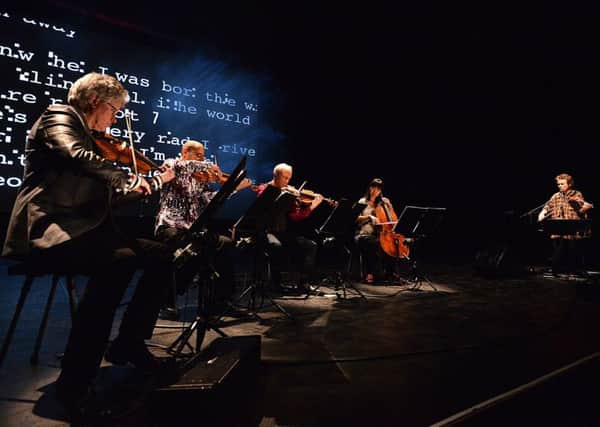Album reviews: Laurie Anderson and Kronos Quartet | MGMT | Grant-Lee Phillips | Ewan Cruikshanks


Laurie Anderson and Kronos Quartet: Landfall (Nonesuch) ****
MGMT: Little Dark Age (Columbia) ****
Grant-Lee Phillips: Widdershins (Yep Roc) ***
Ewan Cruikshanks: A Glasgow Band (Armellodie) ***
Laurie Anderson has dealt with loss in her respected multi-media work before. Her 2015 film and album Heart of a Dog was ostensibly a fond farewell to her dog Lolabelle but also a veiled requiem for her partner Lou Reed and an outlet for the bereavement she felt for her beloved New York in the aftermath of 9/11.
Advertisement
Hide AdHer home city is also the setting for her latest work, developed in collaboration with veteran experimental string ensemble Kronos Quartet, who provide the endlessly expressive acoustic and electric backdrop to Anderson’s poetic remembrances of the day Hurricane Sandy ripped through town, knocking the pips out of the Big Apple.
Landfall begins with the calm before the storm, subtle wind effects and string drones. It’s more than seven minutes before we hear Anderson’s soft caress of a voice, the stillness in the eye of the storm, as she contemplates Sandy’s dramatic, destructive path. The Kronos players add layers of scared scurrying urgency to Darkness Falls and imitate the clank, scratch and squeak of structures in a storm in Dawn of the World before capturing the eerie aftermath and the trepidation of We Head Out.
But Anderson widens her surveillance of devastation to include Nothing Left But Their Names, a ten-minute meditation on endangered species, using pitch-shifted vocals, ambient backing, glacial keyboards and mournful strings, and Everything is Floating, a sober reflection on loss and disposability, before dancing the sad, soulful tango of Gongs and Bells Sing to a slow fade-out, pausing before life goes on, simply because it must.
Where the direction of travel for many bands once they taste success is to rehash or bland out, US indie duo MGMT rebelled against their early popularity by floating further out on the dreamy psychedelic elements of their pop sound. Little Dark Age, their fourth album, continues that voyage with slightly off-kilter rhythms and distorting effects employed to produce the noir whimsy of When You’re Small, the blithe but hectic electro funk of She Works Out Too Much and the woozy exotica of TSLAMP, about the intoxicating effects of a phone screen.
Back on musical terra firma, Grant-Lee Phillips, erstwhile frontman of LA roots rockers Grant Lee Buffalo, has titled his ninth solo album after the old Lowland Scots word for anti-clockwise to encapsulate his anxiety over where humanity is heading, and he sets off on a musically jaunty but lyrically baleful path with Walk In Circles.
The state of his nation lurks in the background but is addressed in universal terms. What he wrote in a heightened state comes out as a soft croon on the breathy sensitivity of King of Catastrophes but there are glimpses of the more dramatic Phillips of old in the Springsteenesque guitar squall and martial beat of Liberation and the punkier strut of Scared Stiff.
Advertisement
Hide AdGlasgow-based troubadour Ewan Cruikshanks is not wanting for character nor variety on his debut album, which is littered with immediate indie pop songs and enhanced by some impressive guitar work, plus the skill-on-a-shoestring production of Catholic Action’s Chris McCrory. A Glasgow Band kicks off with the headlong garage rock thrash Youth Never Dies, before taking in the Glitter Band rhythm of C.A.A.G.B., rapturous lo-fi indie croon For A Girl, soulful chiming guitar on Superman, blissed-out psychedelic rock on Treasure Chest and an all-out 80s sax break on Cosmic Star in a confident, carefree display of mixtape eclecticism.
CLASSICAL
Tippett: Symphonies Nos 1 & 2 (Hyperion) ****
The BBC SSO have been performing Michael Tippett’s symphonies as a thrilling and enlightening live series in Glasgow this season – something to cheer about, given that they’ve sadly gone out of fashion since his death – and now they are becoming available to a wider audience as the SSO, under Martyn Brabbins, releases the first of its recordings, containing Nos 1 and 2. The passage of time allows us to rethink our responses, but suffice to say that Brabbins works faithfully with the scores, giving each a surety of direction, a freshness of response and a generous appreciation of Tippett’s complexity of texture and rhythm, and the idiosyncratic personality of his lyricism.
Advertisement
Hide AdThere’s a delicious adherence to the snatches of English nostalgia in No 1, offset by Tippett’s more combative harshness and underlying mystery. It works well beside the transitional Second Symphony, again solidly convincing in Brabbin’s hands and a teasing appetiser to the next release.
Ken Walton
JAZZ
Blicher Hemmer Gadd: Omara (C-Nut Records) ****
From the first, wheedling cadences of Michael Blicher’s tenor sax as it slides into the louche shuffle of the title track, this is an album that effortlessly manages to give soul jazz, that sometimes maligned sub-genre, a great name.
Recorded live during a European tour and featuring mainly Blicher’s compositions, this trio works up some irresistibly funky grooves. Steve Gadd, a drummer whose credits range from Paul Simon and Steely Dan to Chick Corea, discharges a clamorous, steel-pan-accented solo in that first track, while Hemmer’s Hammond organ slides and gurgles its way slinkily through the old standard Elijah Rock and in the strut of They Had No Roses and If I Were a Cow.
Blicher’s sax ranges sassily through Three Grains of Salt and murmurs its way over Gadd’s stealthy drubbing in the languorous sway of On the Porch, while the trio signs off in the highest of spirits in Korean BBQ.
Jim Gilchrist